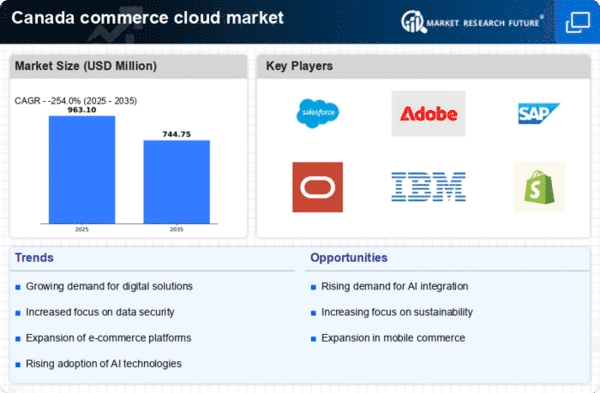Focus on Data Security and Compliance
As data breaches and cyber threats become more prevalent, the emphasis on data security and compliance within the commerce cloud market is intensifying. Canadian businesses are increasingly aware of the need to protect customer information and adhere to regulations such as the Personal Information Protection and Electronic Documents Act (PIPEDA). This regulatory framework mandates strict guidelines for data handling, which has led to a growing demand for secure cloud solutions. The commerce cloud market is adapting by integrating advanced security features, such as encryption and multi-factor authentication, to ensure compliance and build consumer trust. Consequently, companies that prioritize data security are likely to gain a competitive edge, as consumers are more inclined to engage with businesses that demonstrate a commitment to safeguarding their personal information.
Rising Demand for E-commerce Solutions
The surge in online shopping has catalyzed a notable increase in the demand for e-commerce solutions within the commerce cloud market. In Canada, e-commerce sales reached approximately $40 billion in 2024, reflecting a growth rate of around 15% from the previous year. This trend indicates that businesses are increasingly seeking robust cloud-based platforms to enhance their online presence and streamline operations. The commerce cloud market is responding to this demand by offering scalable solutions that cater to various business sizes, from small enterprises to large corporations. As consumer preferences shift towards digital shopping experiences, the need for efficient, reliable, and secure e-commerce solutions is likely to drive further investment in the commerce cloud market, positioning it as a critical component of the retail landscape in Canada.
Expansion of Omnichannel Retail Strategies
The evolution of consumer shopping habits has prompted Canadian retailers to adopt omnichannel strategies, which integrate various sales channels to provide a seamless customer experience. This shift is significantly impacting the commerce cloud market, as businesses seek platforms that can support multiple touchpoints, including online, mobile, and in-store interactions. According to recent data, approximately 70% of Canadian retailers are investing in omnichannel capabilities, recognizing the importance of meeting customers where they are. The commerce cloud market is responding by offering solutions that facilitate inventory management, customer engagement, and data analytics across all channels. This trend not only enhances customer satisfaction but also drives sales growth, as businesses can leverage insights from various channels to optimize their marketing and sales strategies.
Increased Investment in Digital Transformation
The ongoing digital transformation across various sectors is significantly influencing the commerce cloud market in Canada. Businesses are increasingly recognizing the need to modernize their operations and enhance customer experiences through technology. In 2025, it is estimated that Canadian companies will allocate over $15 billion towards digital transformation initiatives, with a substantial portion directed towards cloud-based solutions. The commerce cloud market is poised to benefit from this trend, as organizations seek to leverage cloud technologies for improved efficiency, scalability, and innovation. This investment not only supports the development of new products and services but also enables businesses to respond more effectively to changing market dynamics and consumer preferences.
Growing Importance of Customer Experience Management
In the competitive landscape of retail, the focus on customer experience management is becoming increasingly vital for success. Canadian businesses are recognizing that delivering exceptional customer experiences can lead to higher retention rates and increased sales. The commerce cloud market is adapting to this need by providing tools that enable businesses to personalize interactions and streamline customer journeys. Recent studies indicate that companies prioritizing customer experience are likely to see a 20% increase in customer loyalty. As a result, the demand for commerce cloud solutions that facilitate effective customer engagement and feedback mechanisms is on the rise. This trend suggests that businesses that invest in enhancing customer experiences through cloud technologies may achieve a significant competitive advantage in the marketplace.
















